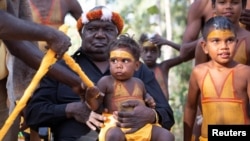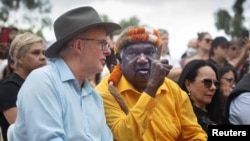One of Australia’s most prominent First Nations leaders of the past century has died. Yolŋu tribal elder Yunupingu passed away at the age of 74 in his homelands in the Northern Territory after a lifetime fighting for the rights of Indigenous people.
Yunupingu was a revered political warrior who fought for Indigenous land rights and recognition in Australia. His name meant “sacred rock that stands against time.” He challenged powerful mining companies and established Australia’s first Aboriginal owned and run bauxite mine. A succession of Prime Ministers also sought his advice.
Yunupingu came to prominence in the 1960s land rights movement.
As a teenager he helped create the first so-called bark petition presented to the Australian parliament in 1963. It was the first time documents pasted onto tree bark representing First Nations relationships with the land were recognized by the federal parliament in Canberra.
The Yirrkala Bark petitions, decorated by Indigenous artists with ochre and charcoal, are considered to be the founding documents of the Aboriginal land rights movement.
Yunupingu was named Australian of the Year — one of the country’s highest civic awards — in 1978.
The elder recently oversaw the setting up of the Gulkula Space Base in partnership with NASA on Aboriginal tribal land in the Northern Territory.
Australian Prime Minister Anthony Albanese wrote on Twitter that the Indigenous leader “walked in two worlds with authority, power and grace.”
However, as Yunupingu aged, he became increasingly disillusioned with the political process. He often conceded that he'd seen little change for Aboriginal communities during his lifetime.
Professor Marcia Langton, Chair of Australian Indigenous Studies at the University of Melbourne, told the Australian Broadcasting Corp. Monday that Yunupingu will be greatly missed.
“He was a magnificent person and a magnificent leader,” Langton remembered. “So many people will be in mourning. He touched so many people with his gracious leadership and kindness. It is such a shame really that he did not live to see better outcomes.”
Yunupingu was also an accomplished singer. His distinctive voice was heard on many recordings of the celebrated Northern Territory rock band, Yothu Yindi. His younger brother Mandawuy Yunupingu was the lead singer.
In a statement, the Yothu Yindi Foundation, a charitable organization, said Yunupingu was “a giant of the nation whose contribution to public life spanned seven decades.”
He was one of Australia’s most influential First Nations leaders, and campaigners say he leaves a legacy of hope.
Australia’s first Indigenous minister for Aboriginal Affairs, Ken Wyatt, said he “was a colossus as a leader.”
Yunupingu died after a long battle with illness, surrounded by friends and family.





